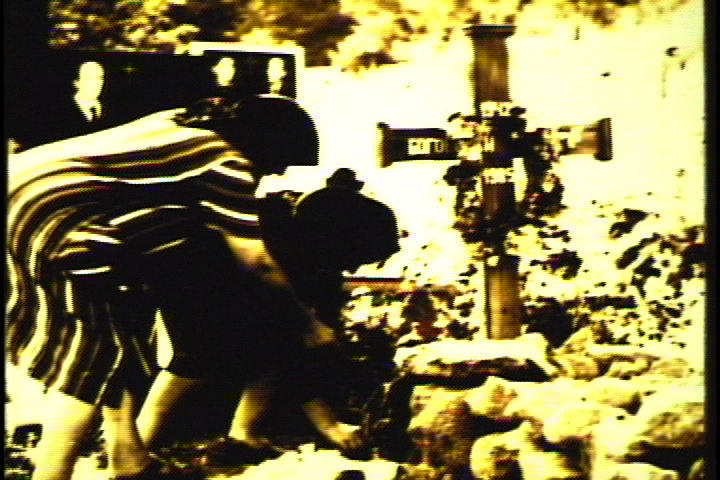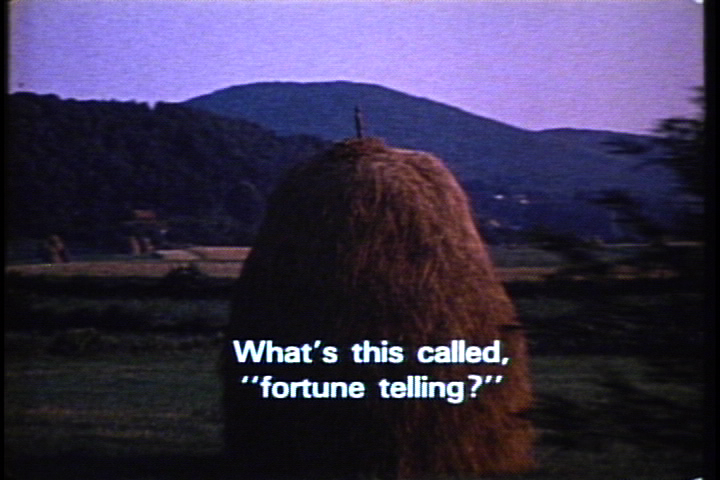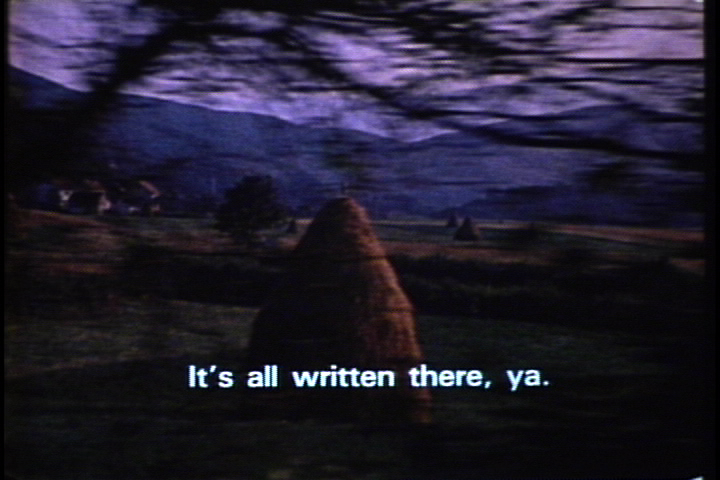Elegy
21 minutes, 1989
Still from Elegy, 1989
Credits:
Production, Camera, Editing, Narration: Gary Popovich
Sound Mix: Steve Sanuedolce
Thanks To: Chris Evans, Jim Evans, Louise Lebeau, The Family
Produced with the assistance of The National Film Board of Canada (Ontario Region) and Liaison of Independent Filmmakers of Toronto (LIFT)
Premiered at TIFF, 1989
“Part diary, part travelogue, part memoriam for a friend’s death, Elegy deftly and poetically blends the private concerns of the filmmaker, a discovery of roots in his native Yugoslavia, and the insubstantiality of remembered moments. Using seductive step printing as an analogy for time, the film turns on itself to depict what it means to document one’s own roots.”
Kass Banning, NOW Magazine
“Elegy also deals with the interlocking puzzles of memory and place. Shot during a trip to Yugoslavia—where the filmmaker learned of a friend’s death—Elegy hauntingly captures the filmmaker’s attempts to deal with a sense of loss that’s both deeply felt and oddly distant.”
Toronto Festival of Festivals Catalague, 1989
“Among the more compelling efforts is Gary Popovich’s Elegy, a 21 minute meditation on a journey to his parent’s homeland and the death of a close friend. Despite its brevity, the film covers a lot of ground. Popovich travelled to Yugoslavia several years ago and seems to have spent most of his time looking through a movie camera…The work remains deeply personal…It also happens to be about real people in real situations. As a result, the emotions it generates are equally real.”
Christopher Hume, Toronto Star
“Images of travel, friendly anonymous faces, places, and conversation start to impress upon the viewer a sense of history and family generations. Progressing through the film the images start to shift, with discussions of a friend’s death, and Popovich’s gentle narration, into the realm of the very personal, linking the private moods and feelings of the filmmaker with these impressions. Here he binds the two and reminds us all of the significance that certain sensory experiences can evoke in one’s mind through memory. This personal journey crosses those boundaries and sensitively portrays times in one’s life that we can all relate to, amplifying the filmmaker’s experiences with our own.”
LIFT Newsletter, October, 1989
“Elegy, which took four years to make, pieces together disconnected images and sounds from Yugoslavia—the native land of Popovich’s parents—in an emotional search for the filmmaker’s roots and the significance of a longtime friend’s death. Twenty one minutes weave the verse of Popovich’s warm narration with lingering shots of the Yugoslavian landscapes, death chants of Serbian women at a graveyard and the native songs and recitations of Yugoslavian children and adults. The video and audio footage Popovich came home with mirrored unconsciously his own confusion. It took painstaking years to tie such eerie places and events like a coffee-cup reading by his aunt, who initially sees good (“What he’s put his mind to will be fulfilled”, she predicts) then catches a dark side (‘Everything’s empty. Everything’s in anxiety’), a cemetery where village women kiss monuments and where life’s water pours from a headstone spout, and an abandoned Turkish fortress that haunts tourists as a death mask. Most chilling are scenes of Popovich’s father, who was in Yugoslavia for the first time in fifty years, scanning photos and remarking on the death of a teenaged friend. ‘For me, that was the most striking thing’, Popovich says. ‘Three days before I found out about Shawn’s death, he was telling me about a friend of his who died—he was 19 years old. I thought that was an incredible coincidence, that he had lost somebody when he was coming to Canada and I had lost a friend while I was over there…’ The film serves as an accessible self-portrait. Popovich had precisely articulated his feelings and has married them with his mix-and-match audio-video technique (which in the past, has included everything from processing film in his bathtub to bleaching and urinating on film). ‘We produce meaning with the films that we come in contact with’, Popovich reasons. ‘I’ve tried to work with that in the film, of allowing all the random feelings and thoughts and memories to be put onto the screen and organize it so the audience can be guided through’.”
Sean Condon, Niagara Falls Review
“Although the patterns in the material arrived with a cloak of death and separation, there was also the life flow of water and numerous objects that stood as reminders of a painful history and as a testament to life. Elegy follows the conventions of the pastoral elegy—a history of past friendship, a questioning of destiny, a procession of mourners, laying flowers, paying tribute, and a consolation.”
Gary Popovich




